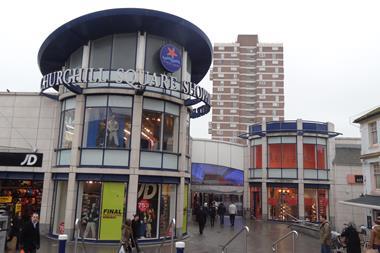Groucho Marx once said: “I refuse to join any club that would have me as a member.”

If the UK was not in the EU club, would it have voted to join? Probably not. REITs are sweeping the bad news under the Brexit carpet and forgetting there is a global growth slump, which is worse.
The UK is struggling with twin deficits, an economy exposed to capital flight and no political leadership. The Bank of England is easing interest rates but has warned that “the uncomfortable truth is that there are limits to what the Bank can do”. Private sector investment will slump, provoking a recession led by falling house prices and consumer retrenchment.
Lower rates and a weaker currency will cushion these negatives, but Moody’s said Brexit would have “negative implications for medium-term growth” and lowered the long-term debt ratings to negative, although it reaffirmed Land Securities’ short-term commercial paper rating, stating: “…low leverage provides it with significant headroom to withstand any potential drop in asset prices”.
Land Securities has adeptly derisked and degeared and the shares have outperformed British Land, which is still overly optimistic about the cycle, by 16% this year. With 10.2% of the latter’s rent roll from Tesco and Sainsbury’s and 5.3% from Debenhams, if you wouldn’t buy these retail stocks then why invest in the landlord?
Output has been cut and exports may become stronger for some goods, but up to 100,000 jobs risk decanting from London to Dublin, Paris and Frankfurt. London may remain the financial centre to the EU and former European Commissioner for Financial Stability Lord Hill cited that passporting for finance firms is negotiable as several European banks use those rules to access the UK. Continued access to the single market, however, isn’t just about financial firms, with Vodafone warning it may move its UK HQ to retain access to the EU.

Analysts have been gazumping each other’s REIT estimates for four years - and the sector has doubled in size - but are now using Brexit as an excuse to cut forecasts and are gazundering each other. Brexit has been a ‘known unknown’ since May 2015, and the real estate market has been losing momentum. IPD All Property returns have halved to circa 10% over two years. In January, we cut our total return forecast to 0% for 2017 with -5% capital values, which was outlandish at the time but now looks too lenient.
REIT shares can go down as well as plummet, and no one knows how this new phony war will shape up. Valuers have an impossible task; however they are not inserting an ‘uncertainty clause’ but adding ‘advisory notes’. There is no transactional evidence but expect a one-off devaluation when article 50 is enacted.
Until then, there is no certainty of valuations other than the recent high-water marks, but UK commercial property funds have cut pricing by 5% and switched from monthly to weekly valuations. Standard Life was the first to suspend dealing, with others swiftly following, and these funds own 5% of the UK commercial real estate market. It might not be 2008, but it’s shaping up to be a rerun of 2007 as funds sell REIT shares to meet redemptions.
Derwent London and Great Portland Estates had boasted their biggest-ever pipelines, but development and tenant risk has been sharply elevated. In REIT-land, boards blithely followed the pollsters into Brexit and few have been buying their own stock, so why should we?
REITs trade between 10% premia (2007) to 50% discounts (2008) to net asset values so prices still don’t look cheap enough to risk going back into the water. Funds selling REIT shares and then real assets could set up a vicious cycle of value destruction. Indeed, if these share prices are right then some REITs might be forced sellers of assets or might even need recapitalising. It’s only eight years since Lehmans collapsed and REIT careers and reputations are on the line - again.
Mike Prew is MD and head of real estate at Jefferies International






























No comments yet